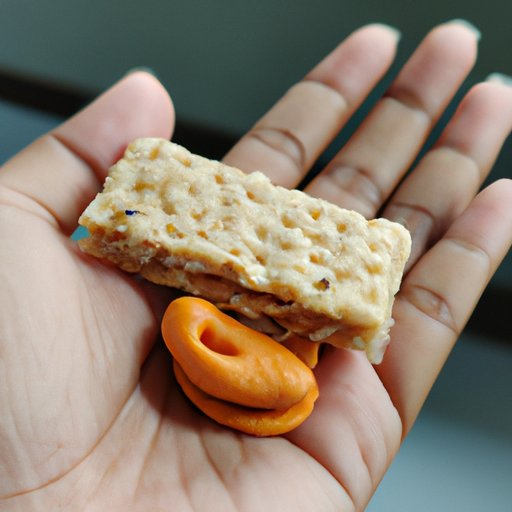Introduction
It’s easy to find yourself overeating without even realizing it. Eating too much can have an adverse effect on your health, so it’s important to be mindful of how much you’re consuming. Mindful eating is the practice of being aware of your food and eating habits. It involves taking time to savor your food, pay attention to what you eat, and being aware of how much you consume.
Practicing Mindful Eating
When it comes to mindful eating, paying attention to what you eat is key. This means choosing high-quality foods that are nutritious and beneficial to your body. It also means reading labels to ensure that your food is free from unhealthy additives or preservatives. Taking time to savor your food is another important aspect of mindful eating. Enjoying every bite and focusing on the flavors and textures of the food can help you appreciate the meal and prevent overeating.
Being aware of how much you eat is just as important as paying attention to what you eat. Eating slowly can help you recognize when you’re full and avoid overeating. Additionally, using smaller plates and utensils can help you control your portion sizes. Taking breaks between meals can also help you assess your hunger level and make sure you’re not overindulging.

Keeping Healthy Snacks On Hand
Having healthy snacks on hand can help you avoid overeating. When you’re hungry, it’s easy to reach for something unhealthy or grab a quick processed snack. Instead, try stocking up on nutritious snacks like fruits and vegetables, nuts, seeds, and whole grains. Prepping snacks ahead of time can be helpful as well, as it gives you something healthy to reach for when you’re in a rush.
Choosing healthy snacks is essential. Opt for snacks that are low in fat and sugar and high in fiber and protein. For example, some great snacks include trail mix, yogurt, hard-boiled eggs, fruit, and vegetables with hummus. Having a variety of snacks on hand can help you stay full and satisfied throughout the day.
Eating Smaller Meals Throughout the Day
Eating smaller meals throughout the day can help you avoid overeating. Eating larger meals can leave you feeling overly full and uncomfortable, while eating smaller meals can keep you energized and prevent you from overindulging. Planning out meals in advance can also help you stick to smaller portions and make sure you’re getting enough nutrients.
Additionally, having healthy snacks on hand can help you avoid reaching for unhealthy options. Eating smaller, more frequent meals can help you maintain a healthy weight and prevent you from overeating.
Drinking More Water
Staying hydrated is essential for overall health. Drinking plenty of water can help you avoid overeating by making you feel fuller and preventing you from snacking too much. Additionally, drinking water can help flush out toxins and improve digestion. Aim to drink at least eight glasses of water a day to stay properly hydrated.
To help you drink more water, try carrying a reusable water bottle with you wherever you go. Setting reminders to drink water throughout the day can also be helpful. Additionally, adding a slice of lemon, lime, or other fresh fruit to your water can give it a refreshing flavor and make it easier to drink.
Avoid Eating When Distracted
Distracted eating can lead to overeating. When you’re distracted, it’s easy to mindlessly eat without even realizing it. To prevent this, try to avoid multitasking while eating. Take time to enjoy your meal and focus on the flavors and textures of the food. Additionally, taking breaks between meals can help you assess your hunger level and make sure you’re not overindulging.
Identifying Triggers for Overeating
Identifying triggers for overeating can help you understand your eating habits and make changes to them. Keeping a food diary can help you track your eating habits and identify patterns. This can be especially helpful if you notice that you tend to overeat in certain situations. Once you’ve identified your triggers, you can work on finding healthier alternatives.
For example, if you tend to overeat when watching television, try going for a walk instead. If you find yourself overeating when you’re stressed, try taking deep breaths or engaging in a calming activity. Finding healthy alternatives can help you break the cycle of overeating and develop healthier habits.
Conclusion
Mindful eating is the practice of being aware of your food and eating habits. Paying attention to what you eat, being aware of how much you eat, and taking time to savor your food can all help you prevent overeating. Additionally, keeping healthy snacks on hand, eating smaller meals throughout the day, drinking more water, avoiding eating when distracted, and identifying triggers for overeating can all help you not eat too much.
By practicing mindful eating and developing healthy habits, you can take control of your eating habits and make sure you’re not overeating. With these tips, you can learn to recognize when you’re full and make sure you’re not overindulging.
(Note: Is this article not meeting your expectations? Do you have knowledge or insights to share? Unlock new opportunities and expand your reach by joining our authors team. Click Registration to join us and share your expertise with our readers.)
